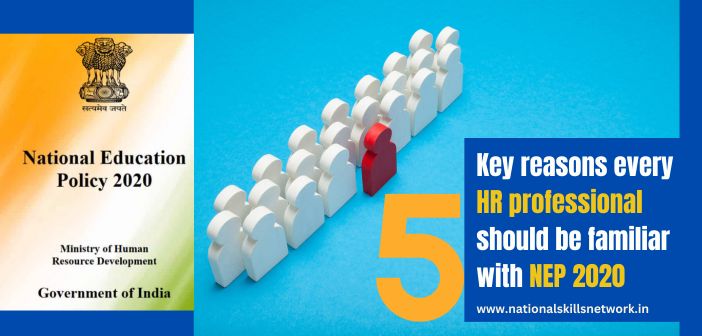The holistic education framework recommended in National Education Policy 2020 (NEP 2020) is a first-of-its-kind opportunity to reimagine the future of workforce development in India. With a pronounced focus on integrating practical skills with academic knowledge NEP 2020 presents a new vision for talent development and employability enhancement. This makes a strong case for HR professionals to get introduced to the policy, appreciate its provisions and participate actively in its implementation.
Let’s look at how NEP 2020 could have a direct bearing on hiring patterns, competency and skill matching for job roles, controlling attrition, recognizing prior learning, building inclusive and 21st-century workplaces, facilitating the transition to the workplace, upskilling and lifelong learning.
NEP 2020: 5 Key reasons every HR professional should be familiar with the policy
Anchor industry-academia engagement: The HR team is usually the primary interface between the industry and the academia. In most cases, the interactions are limited to training and placement of students at the end of various courses. However, with NEP 2020 emphasising on inclusion of skills and applied learning, there could be newer and deeper ways to engage with the academia and training organizations. By looking beyond campus placements and recruitment, the HR professionals can explore how sustainable and mutually beneficial partnerships between industry and academia and be made possible through collaborative curriculum design, faculty development and upskilling as per industry-specific requirements.
Integrate vocational training with business needs: NEP 2020 makes a strong case for integrating vocational training in the academic curriculum to transform the perception of skills and vocational education. Paving the way for work-integrated learning models, the HR teams work closely with the Sector Skill Councils (SSCs), NCVET, Universities, Training Oragnizations, CSR Heads and Non-Profits to add value from the perspective of industry talent requirements. They can also provide inputs on job markets, diversity and inclusion (D&I) impact of technology on jobs and new forms of employment such as gigs and contractual work.

Participate in policy implementation: With a vision to make education flexible multidisciplinary and contemporary, NEP 2020 suggests changes in the way we design and deliver higher education programs. While the National Credit Framework (NCrF) provides a meta framework to implement credit-based learning system, it also re-aligns NSQF and NHEQF with learning outcomes based on competency levels. The HR professional will stand to gain when they get understand the significance of these frameworks in terms of how they can create a positive impact on attracting and retaining talent.
We spoke with Mr. Aditya Mishra, Managing Director and CEO, CIEL HR, to learn more about the role of HR in the changing landscape of skilling and talent management, importance of on-the-job learning, adoption of continuous learning, and more. Click here to read the excerpts from the conversation – https://nationalskillsnetwork.in/role-of-hr-in-the-changing-landscape-of-skilling-and-talent-management/
Branding and communication: With themes like enhanced employability, innovative credit-based courses, choice of multidisciplinary programs, apprenticeship and internship opportunities, there are many ways industry and academia can relook at branding and marketing of their programs. True to the spirit of NEP 2020, with active contributions from HR professionals, the value of skills, vocational education and training can be presented in nuanced ways to the students and parents. This will also help in educating them about the changing nature of jobs, new opportunities for talented youth, the need for lifelong learning and more. The involvement of faculty in these interactions will open new avenues for research, its application and professional development.
Strategic workforce planning: The HR team’s focus on assessing skill and knowledge gaps, demand forecasting and matching it supply of talent could become more aligned with their goals in future. NEP 2020 takes a holistic and wider approach towards education and skilling by connecting education with jobs and entrepreneurship. In a way, this marks a paradigm shift from the traditional notion of education and encourages HR, functional and technical team members from the industry to collaborate, and deliberate for optimizing their talent management processes.
To learn more about NEP 2020, please visit – https://nationalskillsnetwork.in/national-education-policy-2020/
The fact that degrees alone cannot get jobs is yet to find its place in narratives pertaining to higher education. To drive this message and convey its significance, we need to involve HR expertise in many ways. How about getting started with a quick look at NEP 2020 and its understanding and executing its agenda to create a world-class 21st-century workforce!












